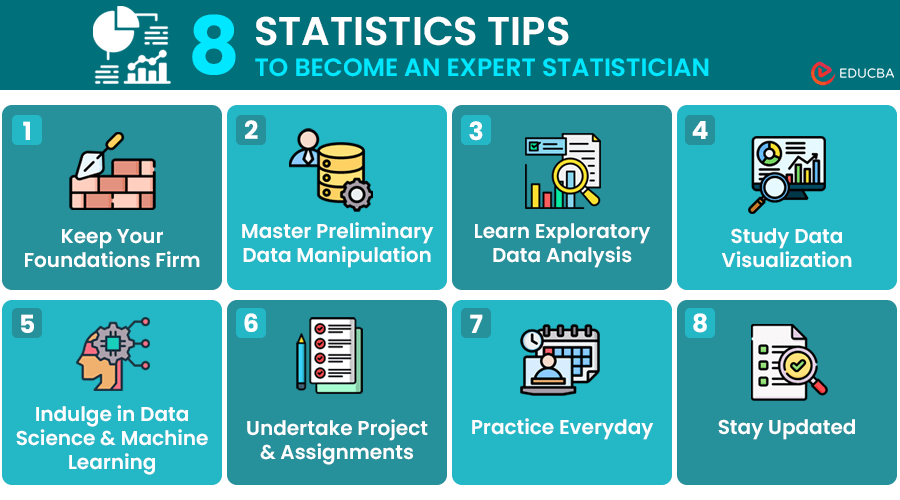
Why are Statistics Tips Important for Aspiring Statisticians?
Statistics tips are practical guidelines or strategies that help statisticians improve their understanding and application of statistical methods. Statisticians are those who analyze data and extract valuable knowledge from it.
There is data all around us. Your browser and search engine are logging your activity and generating data as you read this. The electronic device you are using and the service provider that gave you access to this blog is gathering data about your online activities. Your academic performance, your electric bill, the list of items you bought on Amazon—everything is data, but it is of no use unless you can analyze and process it.
Thus, if you want to boost your ideas on the subject, follow these must-know statistics tips. Moreover, if you are looking for strategies to help with your statistics assignment, you can seek help from experts at MyAssignmentHelp.com, a leading online academic service provider.
Become a Better Statistician – Statistics Tips to Improve Your Skills
Your ability in statistics comes from knowing how to analyze data and understanding the nature of the problems you are dealing with. To enhance your statistical skills, focus on using these fundamental statistical tips.
Some of the most important statistics tips are:
1. Keep Your Foundations Firm
The first thing you need to do is always keep your mathematical problem-solving and algorithmic thinking abilities sharp. Number theory, combinatorics, probability, analytical geometry, and calculus are crucial for statistical analysis. So, practice as many problems as possible of varying difficulty and from different sources.
You must also consider pursuing online courses on statistics. Some of the best courses you can find are:
- “MicroMasters Program in Statistics and Data Science” by Massachusetts Institute of Technology.
- “Post Graduate Diploma in Applied Statistics” by the Indian Statistical Institute.
- “Statistics and R” by Harvard University.
- “Statistical Analysis Course” by EDUCBA
2. Master Preliminary Data Manipulation
Data manipulation is a lifelong skill for every career statistician. Intuitive interpretation and strong manipulation techniques are essential for handling, cleaning, filtering, translating, transforming, and preparing data effectively. You need to understand the type of data sets you are dealing with and determine the best way to manipulate them for analysis and interpretation.
You can find valuable resources like books and YouTube tutorials that cover preliminary cleaning and manipulation in statistical analysis, data science, and analytics. However, if you require immediate assistance with data manipulation for your statistics assignments, consider contacting an expert from a reputable academic writing service.
3. Learn Exploratory Data Analysis
Exploratory data analysis is the starting stage in deep learning, big data analytics, and GPT-based systems. This powerful analysis approach uses statistical methods to analyze, mine, and extract valuable patterns, relationships, outliers, etc., from a dataset. Exploratory analysis depends on the context, so it’s important to know your objectives before examining variables and patterns in data subsets.
To enhance your data analysis technique, work on different kinds of problems with different kinds of datasets. Also, take real-life projects to align your EDA and statistics skills.
4. Study Data Visualization
Data visualization is a vital stage in statistical interpretation. Not only will it aid you in better understanding, but it will also help you communicate interpretations better. Many young learners tend to ignore the visualization stage, which costs them in the long run. Thus, learn to choose the best charts, graphs, and histograms, as well as the right color, formatting, and design for data visualization.
5. Indulge in Data Science & Machine Learning
Data science and machine learning are some of the popular career options today, especially if you have statistics as your college/university major. Data science uses statistical analysis methods for advanced analytics and mining data for useful insights. Machine learning employs data science techniques to learn from data & then automate processes.
You must improve your knowledge of these concepts by taking up online courses on data science & machine learning.
6. Undertake Projects and Assignments
Final-year, capstone, and independent real-life projects are some of the best ways to master statistics in all its glory. Build your basics, learn the applications, and work on advanced topics. Moreover, it would help if you also design/work on analytics or machine learning projects.
7. Practice Everyday
One of the most important statistics tips is to practice. Try solving statistics problems every day, and make sure to work on different kinds of problems. Go beyond your textbooks when looking for problems to solve.
8. Stay Updated
Modern tools and technologies have made statistics easy to learn and master. In addition to Stata, SPSS, SAS, R, and Python, Microsoft’s Power BI and Tableau have made complex data analysis not only easy to implement but also understandable. Furthermore, all of the above apps have vast user and developer communities online where you can find experts and professionals for help. Thus, the last of the statistics tips is to put these to use and stay updated with advances in the statistical field.
Final Thoughts
Statistics is a very challenging subject to master. You will need patience, dedication, tenacity, and consistency. Utilize these statistics tips, develop an affinity for solving different data analysis problems, and never stop learning.
Recommended Articles
We hope this article on “Statistics Tips” was interesting to everyone. The following articles provide excellent tips on similar concepts.

